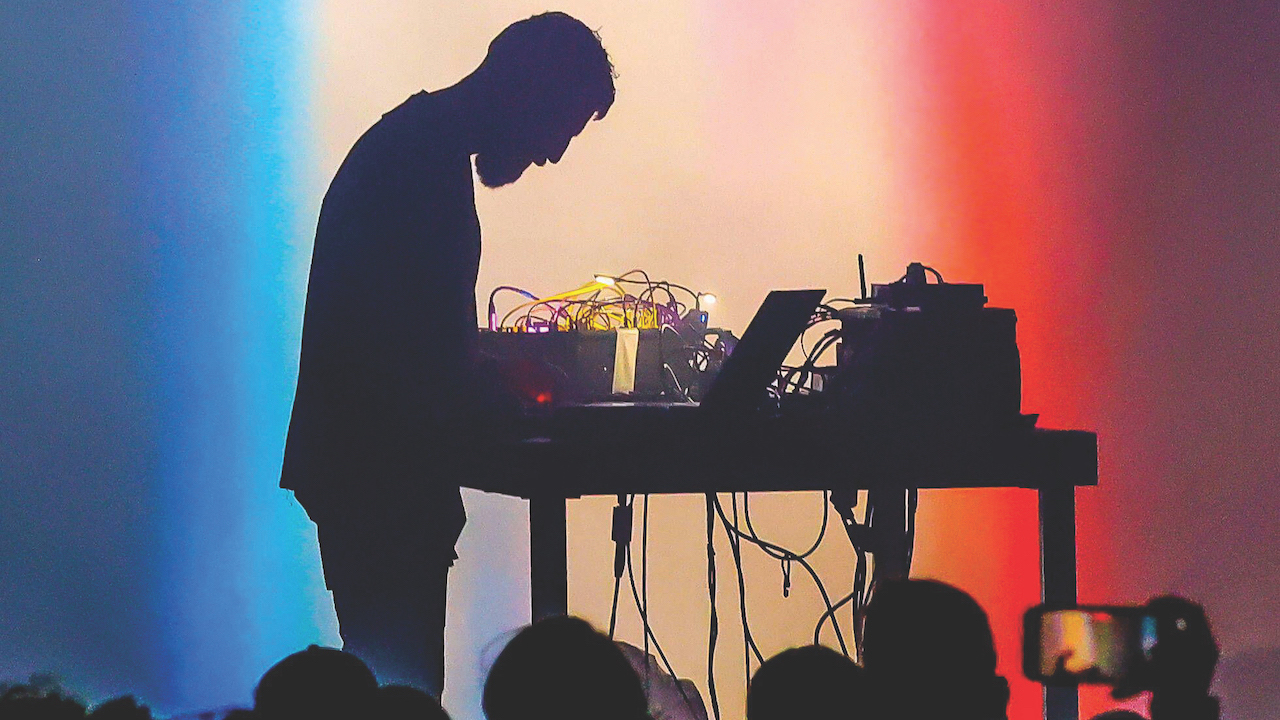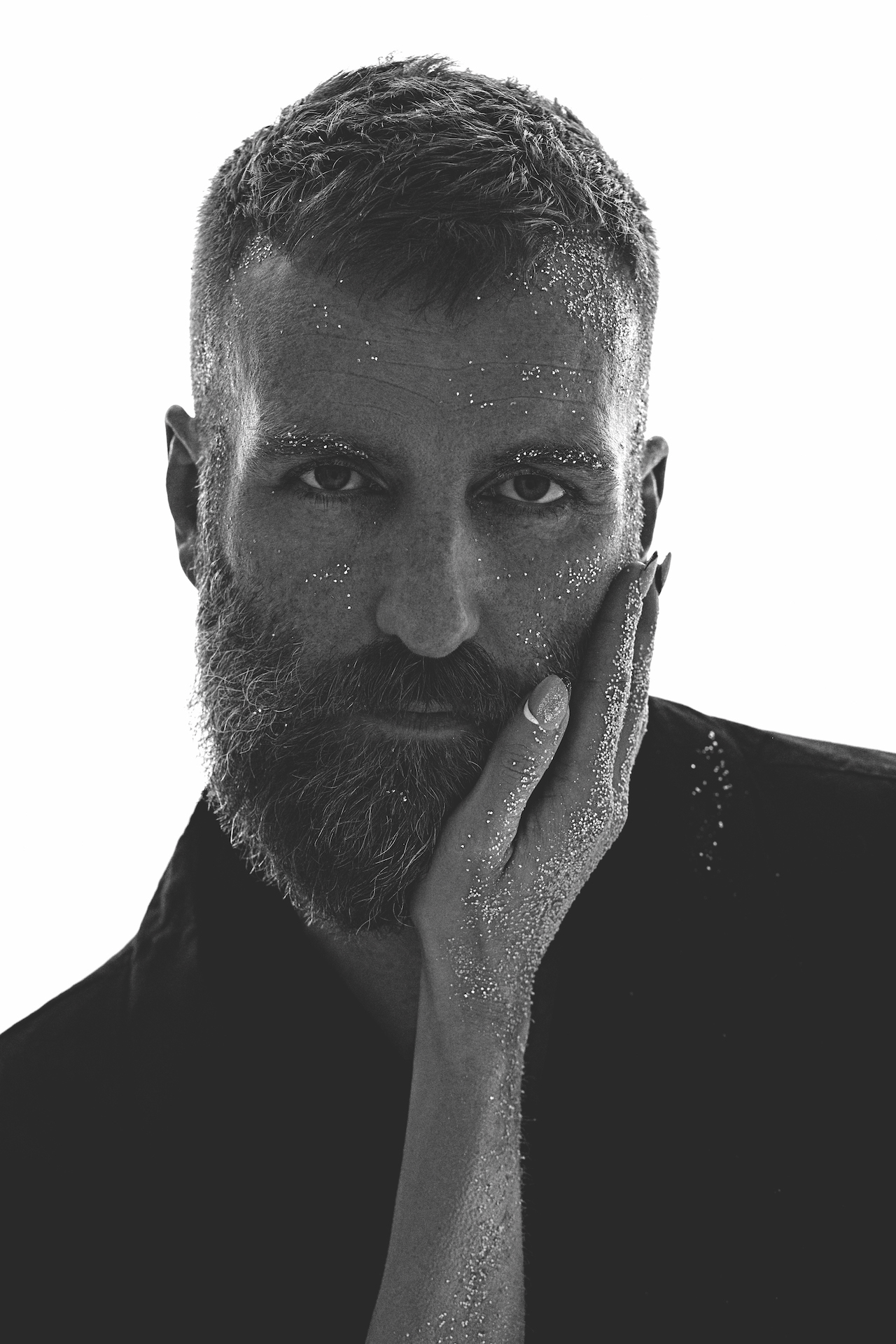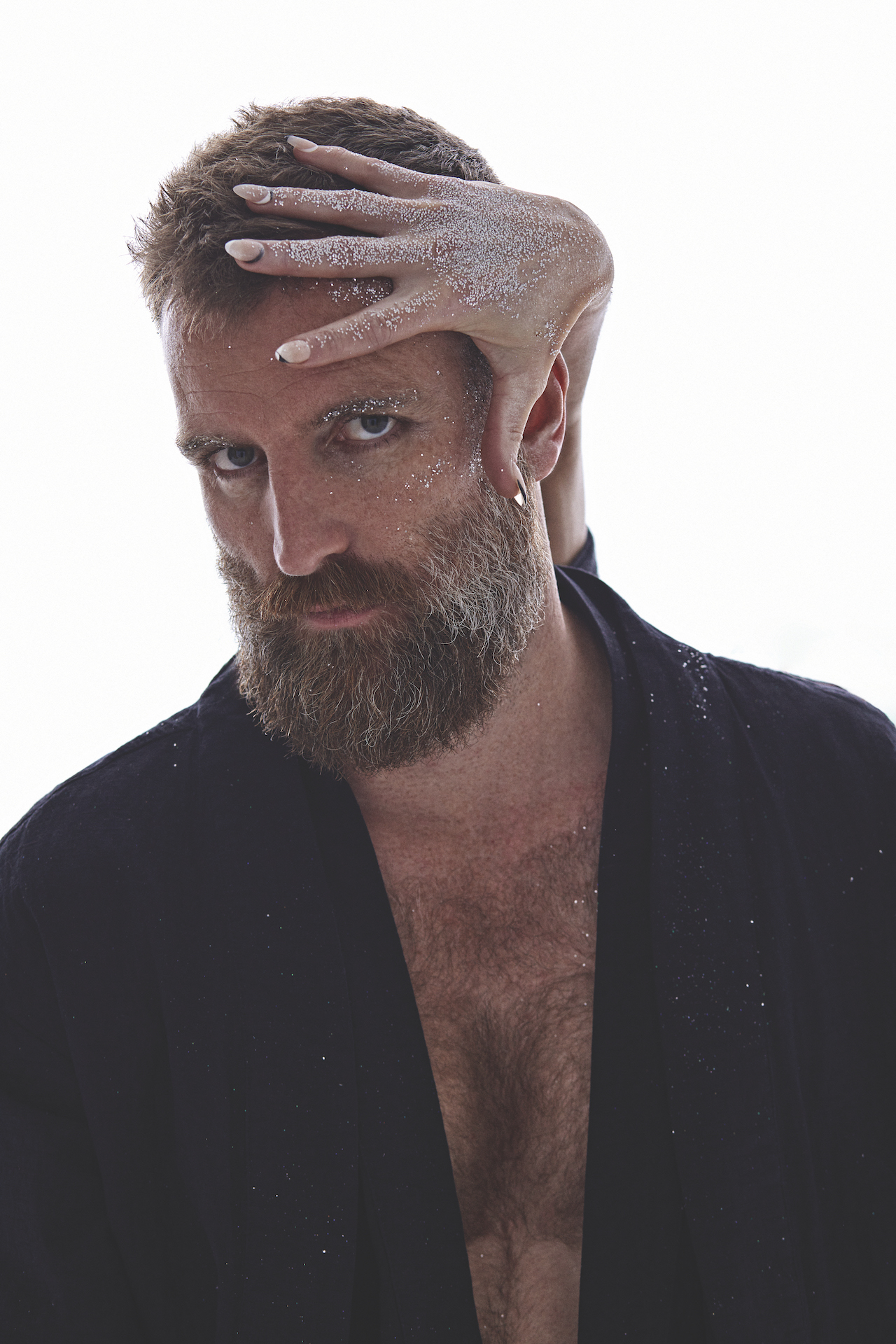Ben Frost on working with Steve Albini: "As a recording engineer, he’s the equivalent of a war photographer – he’s not composing images and dictating proportions, he’s documenting what’s occurring in a space"
On Scope Neglect, Ben Frost extends his guitar obsession by re-engineering our perception of metal music

Want all the hottest music and gear news, reviews, deals, features and more, direct to your inbox? Sign up here.
You are now subscribed
Your newsletter sign-up was successful
Australian-Icelandic sound designer and producer Ben Frost arrived on the music scene in relatively subdued fashion with the ambient glisten of his guitar-oriented LP Steel Wound in 2003.
However, it wasn’t long before his fascination with black metal began to blister and crackle through visceral, ear-churning albums such as Theory of Machines and the suitably titled By the Throat. Widening his palette via increasing use of electronics on subsequent releases, Frost instinctively ventured into the world of sound design for TV, theatre and video games.
Yet despite Frost’s dalliances into soundtrack creation, his attraction to guitar has never wavered. Following a conversation with Mute boss Daniel Miller, he fell upon the idea of recontextualising familiar tropes from the metal genre and enlisted guitarist Greg Kubacki from progressive metal band Car Bomb to help realise his vision.
Frost’s latest album, Scope Neglect, is as captivating as it is groundbreaking, recalibrating our understanding of metal music via a vapour trail of remorseless, grinding riffs and decaying particles of sound.
Around five years into your career, you worked with Brian Eno. How did that come about?
“It was part of a mentorship programme sponsored by Rolex. I received an email about it at some point, which felt very suspicious at the time [laughs], but it turned out I’d been nominated by some committee as a potential candidate and very quickly accepted. The next thing I knew I was in London meeting Brian for the first time. I was obviously a fan, curious to meet him and we spent the day talking for hours.
"The one thing that connected us was a general curiosity for the world and how systems operate and interconnect. The game theory of the universe and how that influence shapes the creative process that lies at the heart of what he’s about and I see a lot of that in myself. To be honest, I’m not sure that Brian is a huge fan of my music, but there’s a resonance in terms of how music and art works and why we respond to some things and are left cold by others.”
Want all the hottest music and gear news, reviews, deals, features and more, direct to your inbox? Sign up here.

In similar terms, what did you learn from working with producer Steve Albini on your previous album, The Centre Cannot Hold?
“You can’t be in a space for an extended period of time with someone like Steve and not learn or come out of that changed in some way. I’d played myself into a space where I wanted subjectivity in my work while still requiring a sense of objectivity, so I came round to the idea that it would be great to have somebody else behind the glass.
"Steve was inevitably behind a lot of the music that was very important to me, so I reached out and he was up for it. As a recording engineer, he’s the equivalent of a war photographer – he’s not composing images and dictating proportions, he’s documenting what’s occurring in a space. He’s also militantly opposed to the idea that he’s imprinting himself upon the process, which of course he is, but working with Steve allows you to feel that sense of space, so I was thrilled to be around him, watch and listen.”
Albini once said pop music is for “children and idiots”. Obviously, the comment is a bit exaggerated, but as someone who takes a more abstract approach to sound, what’s your take on the pop music form?
“In recent years, some of the more adventurous moves in music production have come from pop music and there’s definitely something to be said for the Trojan horse that is a great pop song. I’ve got three kids and my eldest daughter brings a lot of that into my daily life, so I’m often surprised and fascinated by what’s going on there. Is it for children and idiots? I think it’s more complicated than that. Within my film work, there’s zero compromise in some of the music’s sonic extremes, yet people seem to like those records irrespective of the shows themselves.”
You’ve mentioned that making music is a process of absorption via osmosis. Does that infer you need to take periodic breaks to allow something to take shape?
“It always frustrated me as a teenager when bands that I loved, like Portishead, for example, would take four or five years to make a record. I used to think, what are you doing in all that time? When you’re in your early 20s, the ideas come thick and fast, but as the discography tails out, the whole system plateaus and rather than go back down the mountain you’re looking for the next peak, which seems to take longer and longer. A big part of what I do is about pushing the envelope, which does require recalibration when it comes to thinking about what I want to do next or what will be the hardest thing to do.”
So in those terms, what was the starting point for your latest album, Scope Neglect?
Metal has an excess of tropes, specifically the screamed vocal thing, which is something I could never connect with
“I remember having a conversation with Daniel Miller from Mute in Berlin and the subject came around to metal and I was saying that I wished the genre could work in another way. Every genre has baggage and metal has an excess of tropes, specifically the screamed vocal thing, which is something I could never connect with even though the mechanics of the music still fascinates me. Then I listen to a band like Car Bomb, which is at the bleeding edge of what is possible from a metal band in 2024, and I wanted to play around with that.”
How did you meet Car Bomb guitarist Greg Kubacki?
“I sent some fan mail to see if he’d be interested in working with me for a few days. As it turns out, he’s a big fan of what I do and within an hour of meeting it was clear that the DNA of what he does is very much connected to electronic music, specifically stuff like Autechre and Aphex Twin. Greg is truly a master of his instrument; he has a notation method that he invented, which is wild – it’s almost like Morse code with all these weird dashes and dots. I’d explain to him how I wanted something played and he’d write it all out, because that’s how he constructs Car Bomb songs.”
The opening track, Lamb Shift, sounds very aggressive and provocative, but in what way is that related the track’s theoretical title?
“Titles and music tend to arrive in parallel while I’m in the process of making a record. I go on these weird little Wikipedia spirals and ended up reading about Willis Lamb, the physicist behind the quantum field theory. There is no direct correlation, but there was clearly a resonance behind the idea that I was gravitating towards, so I wondered whether there was a way for those things to shape each other. People can Google it, but the Lamb Shift refers to deviations in accepted theories that don’t add up, and that relates to how I was approaching metal from a different angle by taking familiar elements and putting them out of balance.”
Guitar riffs and feedback play a big role in the sound of the record, yet you seem to put elements of the production that producers might normally clean up right at the forefront?
“That’s pretty accurate. I worked with an engineer/producer called Ingo Krauss in an amazing space called Candy Bomber, which is actually at Tempelhof Airport in Berlin. We’d worked together on the last two Swans albums and I recognised that he has a very detailed ear and understands how time plays into recorded music. We wanted to investigate building a meditative space where Greg, bassist Liam Andrews and I could do long takes where things would evolve slowly and find their shape.
"Greg is used to having a drum set behind him and a lot of kinetic energy, but with electronic music there’s not always a lot to grab onto, so I constructed certain rhythmic elements that really only existed for the purpose of fuelling a certain way of performing, knowing full well that I would delete them afterwards.”
What amplification techniques did you create to achieve some of the effects you were seeking?
“I asked Ingo to give me more spaces to feed these elements into, so we put additional speakers in the hallway with mics at varying distances to create makeshift reverb effects that would echo the proximity of Greg’s playing. Then we’d play around with different ribbon and dynamic mics for the sole purpose of grabbing the tail ends of things.
I go on these weird little Wikipedia spirals and ended up reading about Willis Lamb, the physicist behind the quantum field theory
“Where it got interesting for me was taking those parallel recordings and applying really complicated side chain relationships whereby the ambience of a particular sound isn’t audible in the transient moment but opens up as the sound fades away. In that particular way, the negative spaces between the guitars will start to take on a life of their own, creating a different kind of silence.”
Those guitar trails are complemented by electronic sounds. What was the source for those?
“For this record, there was a pretty specific palette in terms of the sound source, for example, the Oberheim OB-Xa was a big source because it has a texture, width and depth that really spoke to me and could form a relationship with the guitars. I also used Mutable Instruments Braids and Plaits quite a lot – anything that had a certain metallic resonance and purity to it. The hub of my studio is a 10-channel Neve Kelso console, which I’ve had for nearly 20 years and is amazing to work with, but I hardly used it for Scope Neglect.
"I was really leaning into the surgical grit, compression and gating of SSL G-Series channel strip EQs, because the severity of that circuitry made more sense to me than the roundness of using an A Class Neve preamp. I wanted sounds that were muscular and lean in shape and Ingo records through a lot of beautiful old bespoke gear and definitely chose a lot of things that had a vintage quality to them as opposed to something clean and digital. That allowed me to lean more into squeezing out the high end and carving out any low-mid fluff from the mix.”
What other tools were you reliant on in the studio to record and modify sounds?
“All of the bass guitar parts were recorded by Liam, also from Melbourne, who has an amazing band called My Disco. He was recording with a fully aluminium, single-piece, metal-bodied bass guitar made by an instrument builder called Obstructures. Weirdly, Steve Albini’s band plays a similar guitar that gives a very pure resonance. I’m still a huge fan of GRM Tools. I haven’t updated them for 15 years, but I’ve still not come across a group of VST effects that sound like their resonator and comb filter.
"I’m also a massive fan of SPL’s hardware Transient Designer, De-Verb, Mo-Verb and Vitaliser, although I inevitably end up using the box versions because of the automation possibilities. There’s something really fascinating that happens when you start trying to remove room from a sound and then put it back using the opposing effect. I guess what I’m trying to do is make elements work harder than they’re supposed to and use the artefacts in such a way that they produce a new space or reality somehow.”
Does software cut it or do you need to turn towards using analogue hardware to match the power and intensity of Greg’s amplified guitars?
The divide between an electric guitar and electronic music is way harder than it should be to convincingly bridge
“I was having a conversation with Alessandro Cortini from Nine Inch Nails the other day and we were talking about exactly that. Even now, the divide between an electric guitar and electronic music is way harder than it should be to convincingly bridge, so that you don’t feel the edges of either. Creating that dissolve between the two is what’s at the crux of the record and you’re right that some of the instrument choices were the result of looking for textures that will speak to that world in a way that doesn’t feel like, here’s the guitar and here’s everything else.”
Is it possible for the power of an amplified electrical signal to ever really be matched by in-the-box sound sources?
“There have often been points where I’ve been blowing out the meters within Ableton or Pro Tools and everything is red and visually saying this isn’t right, but for whatever reason the cumulative effect of squeezing everything through that little doorway in the master bus creates a summing that makes things sound good. The only way to actually capture that is not to render it down or make stems, but feed it physically out of an analogue output and print it back into the system.
"Asking the system to make a copy seems to fail in translation, so taking it outside of the computer and turning it into an electrical signal is required to capture the essence of that. There’s a lot of that in my work and creating that randomness is intoxicating.”
We read that some of the recording techniques you used on Scope Neglect were inspired by the late Mark Hollis of Talk Talk?
“There’s an amazing book by Phill Brown, the engineer responsible for those Talk Talk records, which has a huge section about the process of making them that I and a lot of musician friends of mine have pored over religiously. What Phill and Mark Hollis would do in those sessions is have 20 channels of recording and invite in, for example, a harmonica player but maybe only give him three or four channels, so he’s responding to a skeletal idea for a song.

"They would then do another take and, for example, remove the drums or bass, so now there’s only a piano part to respond to. At some point, the musician would leave the session and Phill and Mark were left with five or six takes that are harmonically connected and responding to the same idea technically but through a drastically different range of approaches. They would then start to edit those takes to form a narrative that the listener only hears as a singular take, constructing a perception that didn’t exist in reality.
"For me, that’s a fascinating idea that speaks very clearly to me as an electronic musician in terms of how to relate to other musicians. It’s akin to sampling rather than dictating to a performer and saying, ‘Can you play this thing I’ve already designed for you?’, then editing those responses to create something that nobody could have planned for.”
You’re referring to the late Talk Talk albums rather than the ones leading up to Colour of Spring?
“For me, Spirit of Eden, Laughing Stock and Mark Hollis’s solo record are in my top five albums of all time. I constantly return to them and it never ceases to amaze me how there is always something new to find in there.”
Ben Frost’s new album Scope Neglect is out March 1 on Mute Records. For more information, visit his website.






